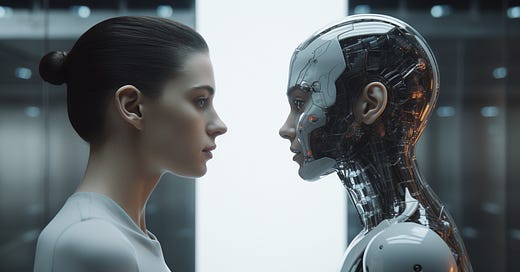As an avid fan of AI and its potential, but also someone who deeply values people, I wanted to share several points that we should keep an eye on over the next few years. This article was 100% written by a human.
People who use AI will out-compete people who refuse AI
Anyone who has used ChatGPT, Midjourney, or any of the other myriad tools will understand the sheer volume and speed of work that AI allows for.
Someone who is skilled will set the direction and use AI as a tool to enhance their final output. Someone who is skilled but doesn’t want to use AI may simply be outpaced by those who do.
AI will replace rote tasks and existing jobs with “prompt creating” positions
People are already creating courses to utilize tools like ChatGPT. It’s only a matter of time until people start coming out with boot camps to help people get into “prompt creation” (though honestly, that could be replaced by AI too).
As people pursue passive income avenues such as course creation as a way to make millions, teaching AI tools to a variety of niche personas may be the next frontier.
“100% human-created” will become a label, and “AI-created” or “AI-assisted” a norm
Similar to the Standard American Diet and the organics/natural foods distinction, we may begin to see indicators like “created by a human” to set writing or artwork apart from AI-generated ones. People gravitate towards the easier option, so AI-assisted will likely become the most popular avenue (vs purely AI-created or purely human-created).
Universal Basic Income will gain increased popularity
People who haven’t developed skills outside of those that AI can replace will increasingly find themselves in a tougher financial situation. This has already been the case for the perennial starving artist or aspiring author. As income inequality in the United States continues to grow, we’ll likely hear more clamor from the bottom 50%. This likely coincides with political polarization and may provide the impetus to implement measures like UBI to help bridge the gap.
Children growing up today will get less practice in writing and critical thinking
Without practice, our skills cannot grow. We will not have the repeated experiences and the fine-tuning process that occurs when one does an activity repeatedly.
One of my main concerns is the ease of access to AI tools, and how that makes it a little too easy for a child to go through school. Sure, it can push them to the top—perhaps it can even write them an award-winning essay. But actual essay writing requires critical thinking—something that the activity helps to develop. I am forever grateful to EXPOS 20, my college freshman writing class, for forcing me to practice written communication.
Tools like ZeroGPT may help prevent blatant AI writing by students. That said, will they all go undetected? What does it mean to write like a human?
People will wonder what it really means to work—and consider alternative models for day-to-day sustenance
Many of us were born into capitalism. We’re familiar with it, we understand how it works, and we’ve been so deep in it—that perhaps we’ve never really questioned why we need to work to survive.
I believe the AI revolution is larger and of a wider scope than the Industrial Revolution, as it replaces not manual labor, but thought labor. If we don’t use our hands or our heads, what is our value in the labor market?
What do you think? Or actually, should we ask ChatGPT?




